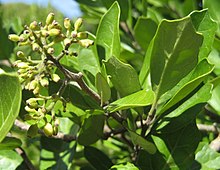Pennantia is the sole genus in the plant family Pennantiaceae. In older classifications, it was placed in the family Icacinaceae.[2] Most authorities have recognised three or four species, depending on whether they recognised Pennantia baylisiana as a separate species from Pennantia endlicheri.[3] British-born botanist David Mabberley has recognised two species.[4]
| Pennantia | |
|---|---|

| |
| Pennantia corymbosa | |
| Scientific classification | |
| Kingdom: | Plantae |
| Clade: | Tracheophytes |
| Clade: | Angiosperms |
| Clade: | Eudicots |
| Clade: | Asterids |
| Order: | Apiales |
| Family: | Pennantiaceae J.Agardh[1] |
| Genus: | Pennantia J.R.Forst. & G.Forst. |
| Type species | |
| Pennantia corymbosa J.R.Forst. & G.Forst.
| |
The species are small to medium, sometimes multi-trunked trees. Leaves are alternate, leathery, and with entire or sometimes toothed margins. Inflorescences are terminal and flowers are functionally unisexual; the species are more or less dioecious.[3]
Pennantia species grow naturally in New Zealand, Norfolk Island, and eastern Australia. In Australia, P. cunninghamii grows across a broad latitudinal natural range (nearly 3,000 km (1,900 mi)), from the south coast of New South Wales northwards through to north eastern Queensland.[citation needed]
The genus name, Pennantia, is in honor of Thomas Pennant, an 18th century Welsh zoologist and author.[citation needed]
Species
editThe following four species were recognised by New Zealand botanists Rhys O. Gardner and Peter J. de Lange in 2002.[3]
- Pennantia baylisiana, (W.R.B.Oliv.) G.T.S.Baylis – Three Kings Islands
- Pennantia corymbosa J.R.Forst. & G.Forst., 'kaikōmako' – New Zealand
- Pennantia cunninghamii Miers, 'brown beech' – NSW, Qld, Australia
- Pennantia endlicheri Reissek – Norfolk Island
References
edit- ^ Angiosperm Phylogeny Group (2009). "An update of the Angiosperm Phylogeny Group classification for the orders and families of flowering plants: APG III" (PDF). Botanical Journal of the Linnean Society. 161 (2): 105–121. doi:10.1111/j.1095-8339.2009.00996.x. hdl:10654/18083. Retrieved 2013-07-06.
- ^ Kårehed, Jesper (2003). "The family Pennantiaceae and its relationships to Apiales". Botanical Journal of the Linnean Society. 141 (1): 1–24. doi:10.1046/j.1095-8339.2003.00110.x.
- ^ a b c Gardner, Rhys O.; de Lange, Peter J. (2002). "Revision of Pennantia (Icacinaceae), a small isolated genus of Southern Hemisphere trees". Journal of the Royal Society of New Zealand. 32 (4): 669–695. Bibcode:2002JRSNZ..32..669G. doi:10.1080/03014223.2002.9517715. S2CID 83782970.
- ^ Mabberley, David J. (2008). Mabberley's Plant-Book (third ed.). UK: Cambridge University Press.
External links
edit